Archive for 2018
A Slumber Did My Spirit Seal
By William Wordsworth
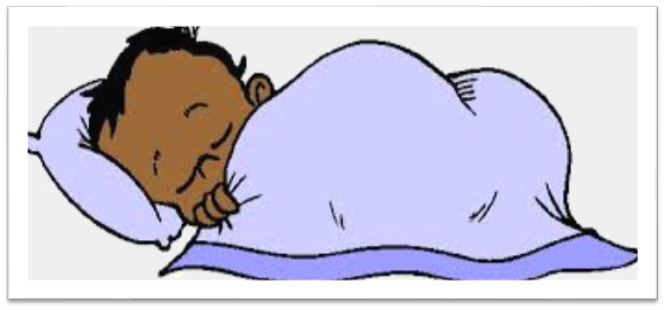
Introduction
This is one of the ‘Lucy poems’ written by William Wordsworth. These poems have been dedicated to his beloved. The poet refers to death which is a permanent sleep. The poet did not realize when his beloved Lucy slept forever i.e. she died. She had taken life for granted and realized this harsh truth of life after her death.
Poem and Explanation
A slumber did my spirit seal—
I had no human fears.
She seemed a thing that could not feel
The touch of earthly years.
I had no human fears.
She seemed a thing that could not feel
The touch of earthly years.
Slumber: sleep
Spirit: soul
Spirit: soul
The poet’s soul had drifted into deep sleep as he did not have any realization of the truth. He had taken life for granted and had never thought that one day death would take Lucy away from him. When she was taken away, he could not bear the loss.
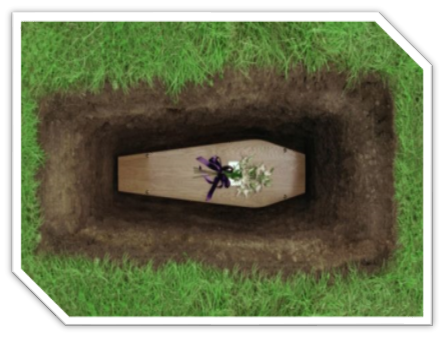
No motion has she now, no force—
She neither hears nor sees,
Rolled round in earth’s diurnal course
With rocks and stones and trees.
She neither hears nor sees,
Rolled round in earth’s diurnal course
With rocks and stones and trees.
diurnal: daily
(Earth’s diurnal course” is earth’s daily rotation on its axis)
(Earth’s diurnal course” is earth’s daily rotation on its axis)
The poet accepts the truth that Lucy is no more. She is motionless, lifeless. She cannot see nor hear. She has been buried in the earth. She will assimilate into the earth and is rotating along with the earth. One day she will become one with the rocks, stones and trees that are a part of the Earth.
Literary devices
1. Rhyme scheme - abab cdcd
2. Alliteration - The repetition of a consonant sound at the start of two or more consecutive words is called alliteration. The instances of alliteration are as follows -
‘Spirit sealed’, ‘rolled round’
2. Alliteration - The repetition of a consonant sound at the start of two or more consecutive words is called alliteration. The instances of alliteration are as follows -
‘Spirit sealed’, ‘rolled round’
3. Enjambment - when a sentence continues into two or more lines ending without any punctuation marks, it is called Enjambment. The instances of enjambment are as follows -
“She seemed a thing that could not feel
The touch of earthly years.”
“She seemed a thing that could not feel
The touch of earthly years.”
“Rolled round in earth’s diurnal course
With rocks and stones and trees.”
With rocks and stones and trees.”
Summary
The poet admits that he was in a sort of a deep sleep because he did not fear the harsh reality of life. He had taken life for granted and had never thought that one day death could separate him from his beloved Lucy. For him she was like an immortal goddess who was unaffected by age and mortality.
As she is dead, she lies motionless. She cannot hear or see. She has been buried in the earth and rotates along with the Earth. One day she will get assimilated with the trees, rocks and stones that are a part of the earth.
As she is dead, she lies motionless. She cannot hear or see. She has been buried in the earth and rotates along with the Earth. One day she will get assimilated with the trees, rocks and stones that are a part of the earth.
Question and Answers
1. “A slumber did my spirit seal,” says the poet. That is, a deep sleep ‘closed off ’ his soul (or mind). How does the poet react to his loved one’s death? Does he feel bitter grief ? Or does he feel a great peace?
A. The poet is full of grief and regret that he had taken things for granted and did not fear the fact that one day death could separate him from his beloved.
2. The passing of time will no longer affect her, says the poet. Which lines of the poem say this?
A. She seemed a thing that could not feel
The touch of earthly years.
The touch of earthly years.
3. How does the poet imagine her to be, after death? Does he think of her as a person living in a very happy state (a ‘heaven’)? Or does he see her now as a part of nature? In which lines of the poem do you find your answer?
A. The poet feels that she is a part of nature. As she has been buried in the Earth, she is a part of it and will assimilate with the rocks, stones and trees. The lines which indicate this are as follows-
“Rolled round in earth’s diurnal course
With rocks and stones and trees.”
“Rolled round in earth’s diurnal course
With rocks and stones and trees.”
A Slumber Did My Spirit Seal By William Wordsworth
The Snake Trying
By WWE Ross
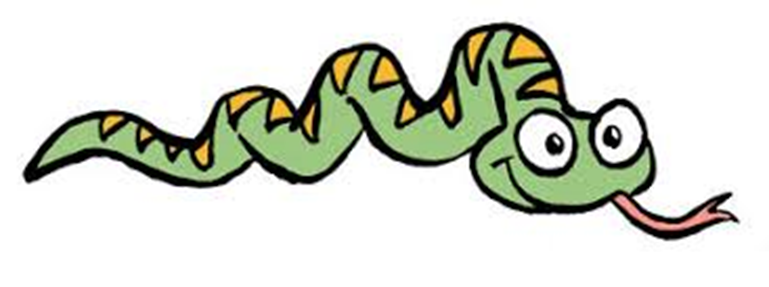
Introduction
In the poem, the poet says that the snake tries to escape from being hit by the stick held by a person who is trying to kill it. The poet wants to say that all snakes are not harmful. Humans have a notion that snakes are dangerous and try to kill them as soon as they spot one but this is not true. He tells us how a harmless green - coloured snake tries to hide behind the green bushes in order to save itself.
Poem and Explanation
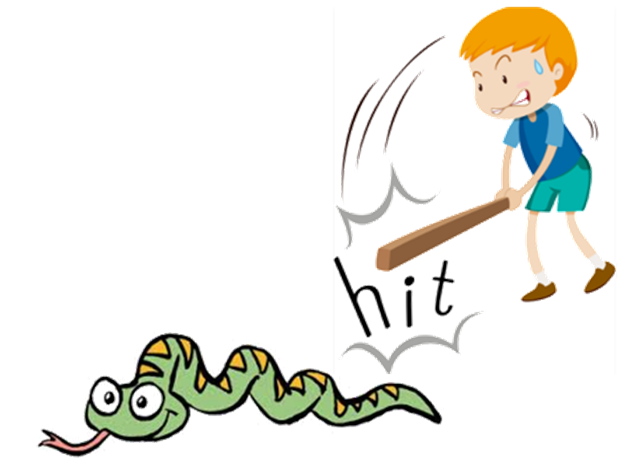
The snake trying
to escape the pursuing stick,
with sudden curvings of thin
long body. How beautiful
and graceful are his shapes!
to escape the pursuing stick,
with sudden curvings of thin
long body. How beautiful
and graceful are his shapes!
Pursuing: Chasing, following
Curvings: Twisting
Curvings: Twisting
The snake tries to escape from being hit by the stick that is following it. As the snake crawls, its body twists and turns forming fascinating shapes.
He glides through the water away
from the stroke. O let him go
over the water
into the reeds to hide
without hurt. Small and green
he is harmless even to children.
from the stroke. O let him go
over the water
into the reeds to hide
without hurt. Small and green
he is harmless even to children.
Glides: Moves
Stroke: Hitting of the stick
Reeds: Water or marsh plants with thick stems
Stroke: Hitting of the stick
Reeds: Water or marsh plants with thick stems
The snakes moves through the water in order to save itself. The poet pleads to let it escape and hide behind the thick marshy plants as it is harmless. The small green - coloured snake is harmless even to children.
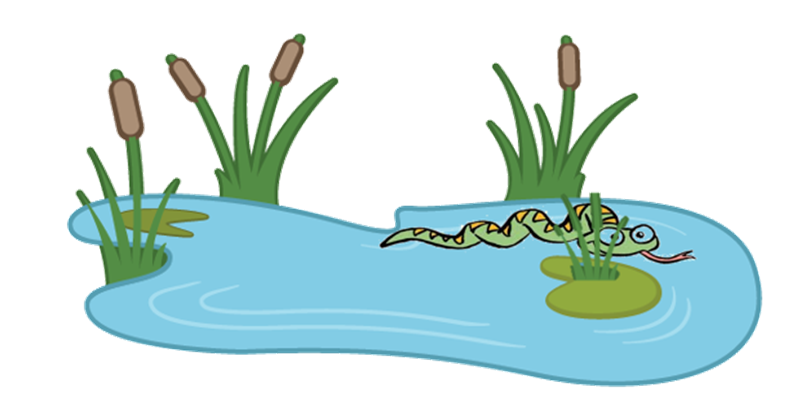
Along the sand
he lay until observed
and chased away, and now
he vanishes in the ripples
among the green slim reeds.
he lay until observed
and chased away, and now
he vanishes in the ripples
among the green slim reeds.
Vanishes: Disappears
Till it was spotted and chased away by the person holding a stick, it lay quietly in the sand. In order to save itself, the snake disappears in the ripples of the water and hides in the camouflaging green bushes of the marshy plants.
Literary devices
1. Rhyme scheme is absent. The poem is written in free verse.
2. Transferred epithet: the adjective used with a noun refers to a noun other than the one with which it is used.
Pursuing stick - pursuing refers to the person who is holding the stick and not the stick itself.
3. Alliteration: the repetition of a consonant sound in 2 or more consecutive words.
He is harmless - ‘h’
2. Transferred epithet: the adjective used with a noun refers to a noun other than the one with which it is used.
Pursuing stick - pursuing refers to the person who is holding the stick and not the stick itself.
3. Alliteration: the repetition of a consonant sound in 2 or more consecutive words.
He is harmless - ‘h’
Summary
In this poem, a harmless green - coloured snake tries to save itself from being hit by a person who is chasing it with a stick to kill it. The poet says that the snake is harmless even to children. People fear snakes and when they see one, they try to kill it with a stick. The snake tries to save itself and hides behind the green - coloured bushes of marshy plants growing in the water. It hides in the ripples of the water body in order to save itself. The snake disappears behind the marshy plants.
Question Answers
1. What is the snake trying to escape from?
A. The snake is trying to escape the person who is chasing it with a stick and is trying to hit it.
2. Is it a harmful snake? What is its colour?
A. The snake is harmless. It is green in colour.
3. The poet finds the snake beautiful. Find the words he uses to convey its beauty.
A. The words used to describe the snake are beautiful and graceful.
4. What does the poet wish for the snake?
A. The poet wishes that the snake saves itself.
5. Where was the snake before anyone saw it and chased it away? Where does the snake disappear?
A. Before it was seen, it was lying in the sand. It disappears behind the marshy plants.
A Snake Trying
On Killing A Tree
By Gieve Patel
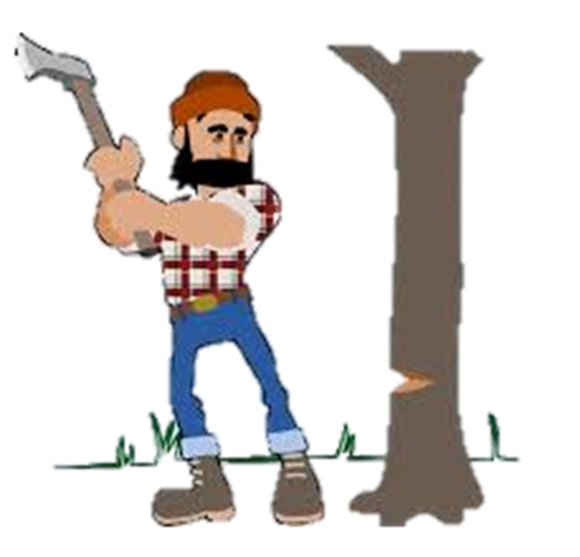
Introduction to the lesson
The poet sensitizes the reader and highlights the fact that trees are living things. He equates trees with humans to convey that trees should not be cut because destroying trees is just like killing a human being. A tree does not die by merely cutting because it regrows from where it is cut. If it has to be destroyed, then it has to be uprooted.
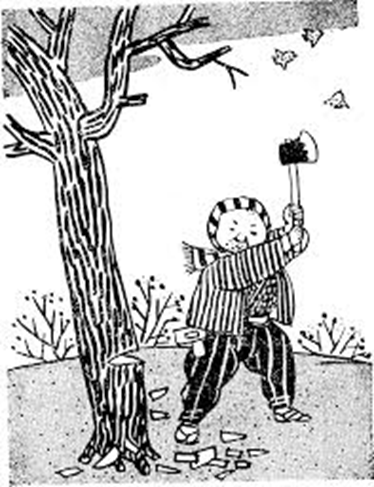
Poem and Explanation
It takes much time to kill a tree,
Not a simple jab of the knife
Will do it. It has grown
Slowly consuming the earth,
Rising out of it, feeding
Upon its crust, absorbing
Years of sunlight, air, water,
And out of its leprous hide
Sprouting leaves.
Not a simple jab of the knife
Will do it. It has grown
Slowly consuming the earth,
Rising out of it, feeding
Upon its crust, absorbing
Years of sunlight, air, water,
And out of its leprous hide
Sprouting leaves.
Jab: sudden rough blow
Leprous hide: discoloured bark
Leprous hide: discoloured bark
A simple cut does not destroy a tree. A tree grows gradually, it is rooted in the soil. A plant takes nutrition from the soil to grow into a big tree. The tree is firmly bound with the soil. It takes in sunlight, water and air to grow into a strong trunk and have numerous leaves.
So hack and chop
But this alone won't do it.
Not so much pain will do it.
The bleeding bark will heal
And from close to the ground
Will rise curled green twigs,
Miniature boughs
Which if unchecked will expand again
To former size.
But this alone won't do it.
Not so much pain will do it.
The bleeding bark will heal
And from close to the ground
Will rise curled green twigs,
Miniature boughs
Which if unchecked will expand again
To former size.
Hack: cut roughly by striking heavy blows
Humans cut and chop the bark of trees into many pieces but that is not sufficient to destroy the tree. The point of the tree which gets cut gives out sap just like a human being bleeds. Gradually, this would heals and from there new branches start growing again.
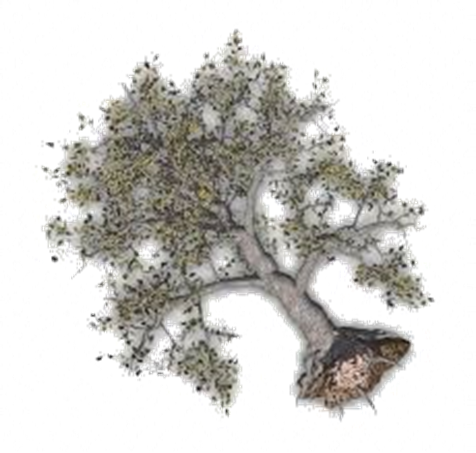
No,
The root is to be pulled out —
Out of the anchoring earth;
It is to be roped, tied,
And pulled out — snapped out
Or pulled out entirely,
Out from the earth-cave,
And the strength of the tree exposed
The source, white and wet,
The most sensitive, hidden
For years inside the earth.
The root is to be pulled out —
Out of the anchoring earth;
It is to be roped, tied,
And pulled out — snapped out
Or pulled out entirely,
Out from the earth-cave,
And the strength of the tree exposed
The source, white and wet,
The most sensitive, hidden
For years inside the earth.
Anchoring earth: trees are held securely with the help of the roots in the earth
Snapped out: chopped out
Snapped out: chopped out
The poet says that in order to kill the tree, it has to be uprooted. One has to separate the tree from the Earth which supports it. The roots of the tree bind the tree with the soil in the pit of the Earth. From there, the most sensitive and hidden part of the tree - the roots have to be detached. The roots are white in colour and are damp.
Then the matter
Of scorching and choking
In sun and air,
Browning, hardening,
Twisting, withering,
And then it is done.
Of scorching and choking
In sun and air,
Browning, hardening,
Twisting, withering,
And then it is done.
Scorching and choking: the drying up of the tree after being uprooted
Once the tree has been uprooted, then gradually it withers and dries up with the action of heat and wind. The trunk will become brown, twist and will harden. Finally, the tree will die this way.
Literary Devices
1. No rhyme scheme is there in the poem. It is written in free verse. There is no rhyme or rhythm.
2. Enjambment: When one sentence continues into two or more lines.
Not a simple jab of the knife
Will do it. It has grown
Slowly consuming the earth
2. Enjambment: When one sentence continues into two or more lines.
Not a simple jab of the knife
Will do it. It has grown
Slowly consuming the earth
Rising out of it, feeding
Upon its crust, absorbing
Years of sunlight, air, water,
And out of its leprous hide
Sprouting leaves.
Upon its crust, absorbing
Years of sunlight, air, water,
And out of its leprous hide
Sprouting leaves.
The most sensitive, hidden
For years inside the earth.
For years inside the earth.
3. Metaphor: indirect comparison
Leprous hide - the uneven colour of the surface of the trunk of a tree is compared to the skin of a person suffering from leprosy.
Leprous hide - the uneven colour of the surface of the trunk of a tree is compared to the skin of a person suffering from leprosy.
Bleeding bark - the sap coming out of tree where it is cut is compared to the bleeding from the wound in a human’s body.
4. Alliteration: repetition of a consonant sound in 2 or more closely places words.
Bleeding bark - ‘b’ sound
White and wet - ‘w’ sound
Bleeding bark - ‘b’ sound
White and wet - ‘w’ sound
5. Repetition: a word or sentence is repeated to lay emphasis on it.
‘Pulled out’ is repeated
‘Pulled out’ is repeated
Summary
“On Killing a Tree” is a sensitive poem. The poet persuades the reader not to destroy trees and equates it with “killing” a human being. He says that a plant takes sunlight, water, air and nutrients from the soil to gradually become a huge tree. It develops a strong trunk and gets numerous leaves.
Merely cutting the trunk of the tree does not kill it. When a tree is cut, the sap flows out just like a wounded man bleeds. Once the wound heals, new branches and tiny leaves grow from there which grow into trees.
In order to destroy a tree, it has to be uprooted. The roots which are white in colour and are damp due to the moisture that they get from the soil are hidden in a pit in the Earth. These roots are the most sensitive part of the tree as they bind it to the earth. In order to kill the tree, these roots have to be detached from the soil.
Once the roots are detached, the tree starts dying, It withers, dries up with the action of heat and wind, twists, hardens and finally, dies.
Merely cutting the trunk of the tree does not kill it. When a tree is cut, the sap flows out just like a wounded man bleeds. Once the wound heals, new branches and tiny leaves grow from there which grow into trees.
In order to destroy a tree, it has to be uprooted. The roots which are white in colour and are damp due to the moisture that they get from the soil are hidden in a pit in the Earth. These roots are the most sensitive part of the tree as they bind it to the earth. In order to kill the tree, these roots have to be detached from the soil.
Once the roots are detached, the tree starts dying, It withers, dries up with the action of heat and wind, twists, hardens and finally, dies.
Question and Answers
1. Can a “simple jab of the knife” kill a tree? Why not?
A. No, a simple jab of the knife cannot kill a tree. The place from where the tree is cut will give out sap and once the wound heals, new branches and leaves will grow from it which will develop into trees.
2. How has the tree grown to its full size? List the words suggestive of its life and activity.
A. The tree has grown by consuming nutrients from the Earth, absorbing sunlight, air and water. The words suggestive of its life and activity are - consuming the earth, Rising out of it, feeding Upon its crust, absorbing years of sunlight, air, water.
3. What is the meaning of “bleeding bark”? What makes it bleed?
A. Bleeding bark refers to the sap which flows out of the tree’s bark where it is cut. The tree bleeds when it is cut with a knife.
4. The poet says “No” in the beginning of the third stanza. What does he mean by this?
A. ’No’ means that the tree will not die by cutting or chopping the trunk.
5. What is the meaning of “anchoring earth” and “earth cave”?
A. “Anchoring Earth” means that the Earth supports the tree firmly. “Earth cave” refers to the pit in the Earth where the roots of the tree bind it firmly to the Earth.
6. What does he mean by “the strength of the tree exposed”?
A. “the strength of the tree exposed” means that upon being uprooted, the most sensitive and important part of the tree i.e. the roots will no longer remain hidden in the Earth.
7. What finally kills the tree?
A. The tree dies when it is uprooted. When it is detached from the Earth, it withers, hardens twists and finally dies.
On Killing A Tree By Gieve Patel
The Duck and the Kangaroo
By Edward Lear
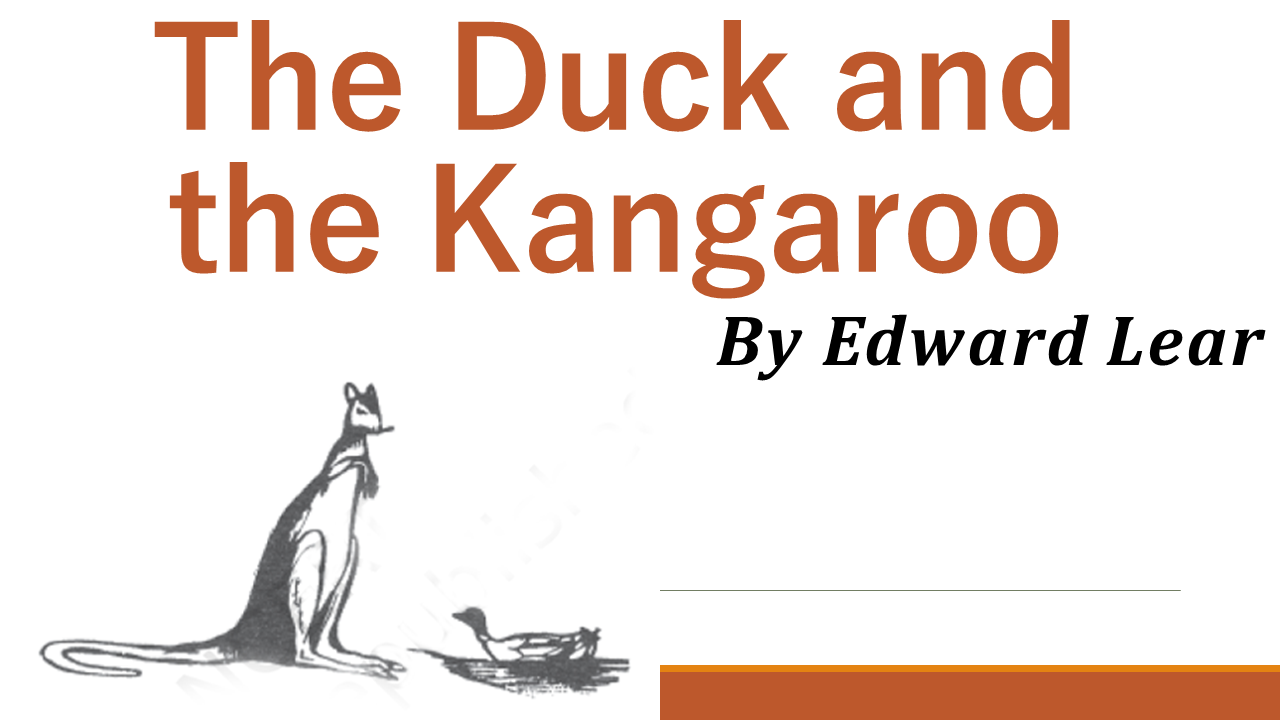
Introduction to the poem
The poem elaborates the desire of a duck confined within the limits of the pond to go beyond and travel the world like the kangaroo did. The duck requests the kangaroo to take it on a trip and find a solution to the problems which the kangaroo would face.
Explanation
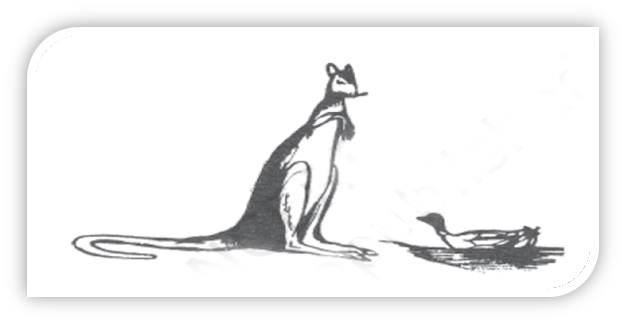
I
Said the Duck to the Kangaroo,
“Good gracious! how you hop!
Over the fields and the water too,
As if you never would stop!
My life is a bore in this nasty pond,
And I long to go out in the world beyond!
I wish I could hop like you!”
Said the Duck to the Kangaroo.
Said the Duck to the Kangaroo,
“Good gracious! how you hop!
Over the fields and the water too,
As if you never would stop!
My life is a bore in this nasty pond,
And I long to go out in the world beyond!
I wish I could hop like you!”
Said the Duck to the Kangaroo.
Nasty: unpleasant, bad
The duck is awestruck to see the movement of the kangaroo. It expressed that the kangaroo could hop continuously over the fields and water bodies. The ducks life was boring as it remained in the pond all the time. It wished to see the world beyond the limits of the pond. It wishes that it could also hop like the kangaroo.
II
“Please give me a ride on your back!”
Said the Duck to the Kangaroo.
“I would sit quite still, and say nothing but ‘Quack’,
The whole of the long day through!
And we’d go to the Dee, and the Jelly Bo Lee,
Over the land, and over the sea;
Please take me a ride! O do!”
Said the Duck to the Kangaroo.
“Please give me a ride on your back!”
Said the Duck to the Kangaroo.
“I would sit quite still, and say nothing but ‘Quack’,
The whole of the long day through!
And we’d go to the Dee, and the Jelly Bo Lee,
Over the land, and over the sea;
Please take me a ride! O do!”
Said the Duck to the Kangaroo.
Quack: sound made by the duck
The duck requests the kangaroo to give it a ride on its back. It promised that it would sit quietly and would just quack all day. The duck lists the places that they would visit as Dee and Jelly Bo Lee. It adds that they would hop over the land and the sea.
III
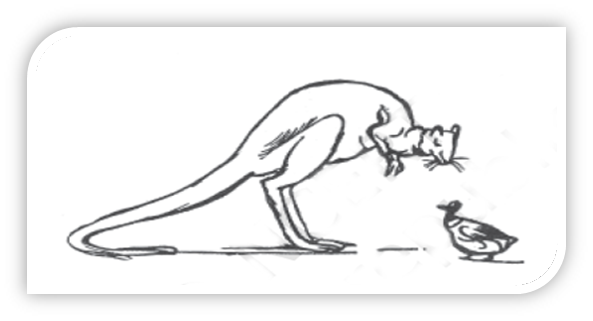
“This requires some little reflection;
Perhaps on the whole it might bring me luck,
And there seems but one objection,
Which is, if you’ll let me speak so bold,
Your feet are unpleasantly wet and cold,
And would probably give me the roo-
Matiz!” said the Kangaroo.
Reflection: thought, pondering
Roo-matiz: refers to the disease of rheumatism
Roo-matiz: refers to the disease of rheumatism
The kangaroo replied that it had to think over it. The idea could be good for him but he had an objection - that the duck’s wet and cold feet could give it body pains.
IV
Said the Duck, “As I sat on the rocks,
I have thought over that completely,
And I bought four pairs of worsted socks
Which fit my web-feet neatly.
And to keep out the cold I’ve bought a cloak,
And every day a cigar I’ll smoke,
All to follow my own dear true
Love of a Kangaroo!”
Said the Duck, “As I sat on the rocks,
I have thought over that completely,
And I bought four pairs of worsted socks
Which fit my web-feet neatly.
And to keep out the cold I’ve bought a cloak,
And every day a cigar I’ll smoke,
All to follow my own dear true
Love of a Kangaroo!”
Cloak: shrug
The duck said that as it sat on the rocks during the day, it had thought over it. In order to avoid that, the duck had bought four pairs of worsted socks which fitted its web - shaped feet well. In order to stay warm, it would wear a shrug and also, smoke a cigar every day. The duck would do all this to protect the kangaroo as it was a beloved.
V
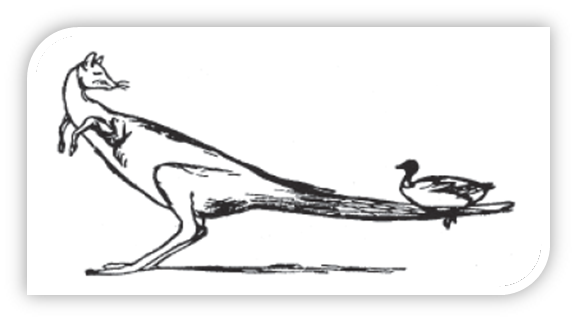
All in the moonlight pale;
But to balance me well, dear Duck, sit steady!
And quite at the end of my tail!”
So away they went with a hop and a bound,
And they hopped the whole world three times round;
And who so happy — O who,
As the Duck and the Kangaroo?
The kangaroo was satisfied with the duck’s response and got ready for the ride. At night, when the sky was filled with the pale light of the moon, they started their trip with a hop. The kangaroo asked the duck to hold it firmly and they travelled around the world three times. Both of them enjoyed each other’s company.
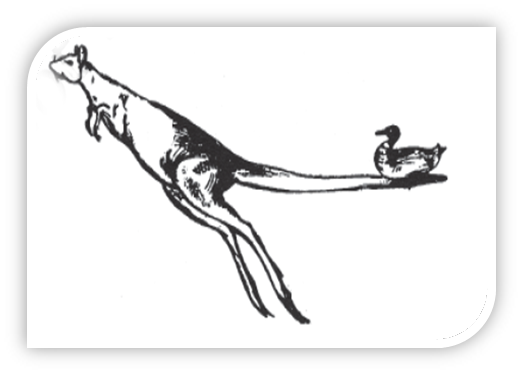
Literary devices
1. Rhyme scheme
Stanza 1 - ababccaa
Stanza 2 - ababccbb
Stanza 3, 4, 5 - ababccdd
Stanza 1 - ababccaa
Stanza 2 - ababccbb
Stanza 3, 4, 5 - ababccdd
2. Alliteration - The repetition of a consonant sound at the start of two or more closely placed words.
a) Good gracious- ‘g’
b) how you hop - ‘h’
c) sit quite still, and say - ‘s’
d) But to balance- ‘b’
e) dear duck - ‘d’
f) whole world - ‘w’
a) Good gracious- ‘g’
b) how you hop - ‘h’
c) sit quite still, and say - ‘s’
d) But to balance- ‘b’
e) dear duck - ‘d’
f) whole world - ‘w’
3. Anaphora- When the same word is used at the start of 2 or more consecutive lines.
Instances of anaphora in the poem are as follows -
a) And to keep out the cold I’ve bought a cloak,
And every day a cigar I’ll smoke,
Instances of anaphora in the poem are as follows -
a) And to keep out the cold I’ve bought a cloak,
And every day a cigar I’ll smoke,
b) And they hopped the whole world three times round;
And who so happy — O who,
Both the pairs of sentences begin with ‘and’.
And who so happy — O who,
Both the pairs of sentences begin with ‘and’.
4. Refrain- the use of a musical rhyming sentence throughout the poem. “Said the duck to the kangaroo” has been repeated to lay stress on the request made by the duck to the kangaroo.
5. Enjambment - When the same sentence continues in two or more lines.
Instances of enjambment in the poem are as follows -
a) “And I bought four pairs of worsted socks
Which fit my web-feet neatly.”
Instances of enjambment in the poem are as follows -
a) “And I bought four pairs of worsted socks
Which fit my web-feet neatly.”
b) “All to follow my own dear true
Love of a Kangaroo!”
Love of a Kangaroo!”
Summary
The poem gives an account of a conversation between a duck and a kangaroo. The duck praises the kangaroo for its ability to hop and visit places. The duck finds the pond boring as it has to stay there forever. The duck requests the kangaroo to make it sit on its back and go on a trip to places like the Dee, and the Jelly Bo Lee, crossing lands and seas. It promises that it would remain quiet and would only quack. The kangaroo replies that it will have to think over it because the duck’s wet and cold feet may give it body pains - the disease of rheumatism.
The duck says that it has made arrangements for the kangaroo’s safety. It had got four pairs of worsted socks which fitted the web - shaped feet well. Additionally, it would wear a cloak to save itself from the cold weather and would smoke one cigar a day too. The duck loves the kangaroo and so, wants to take precautions for its well - being. The kangaroo agrees to take the duck on a trip. It asks the duck to sit firmly and not to move.
The duck sits on the kangaroo’s back. The kangaroo starts with a hop and they take three trips around the world. Both of them enjoy each other’s company.
The duck says that it has made arrangements for the kangaroo’s safety. It had got four pairs of worsted socks which fitted the web - shaped feet well. Additionally, it would wear a cloak to save itself from the cold weather and would smoke one cigar a day too. The duck loves the kangaroo and so, wants to take precautions for its well - being. The kangaroo agrees to take the duck on a trip. It asks the duck to sit firmly and not to move.
The duck sits on the kangaroo’s back. The kangaroo starts with a hop and they take three trips around the world. Both of them enjoy each other’s company.
The Duck and Kangaroo/ Text Explanation
CBSE Class IX Beehive Lesson 7 - Packing
By Jerome K Jerome (an extract from Three Men in a Boat)
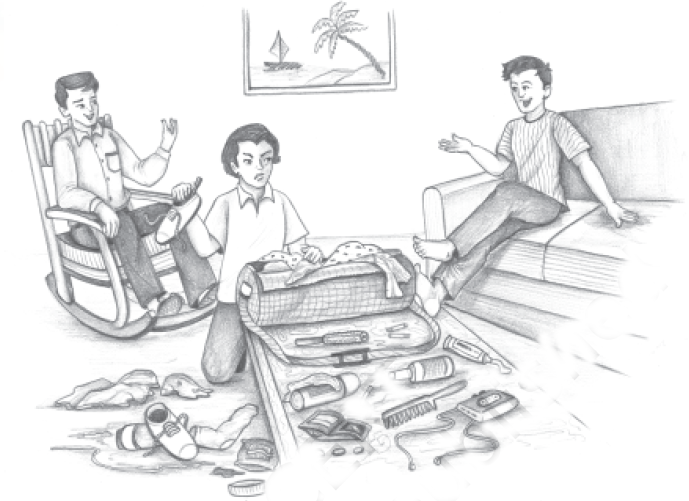
Introduction to the lesson
Lesson and explanation
I SAID I’d pack.
The writer, Jerome liked to pack luggage for trips and announced that he would do the packing.
I rather pride myself on my packing. Packing is one of those many things that I feel I know more about than any other person living. (It surprises me myself, sometimes, how many such things there are.) I impressed the fact upon George and Harris and told them that they had better leave the whole matter entirely to me. They fell into the suggestion with a readiness that had something uncanny about it. George spread himself over the easy-chair, and Harris cocked his legs on the table.
pride myself on: am proud of
fell into: here, accepted
Uncanny: strange, weird
cocked his legs: bent the legs on the knee as he sat
Jerome thought that his ability to pack luggage was better than others. He asked his friends George and Harris to leave the task of packing to him. The two friends agreed to his offer instantly which was strange. George sat comfortably on the easy - chair and Harris bent his knees as he sat on the sofa and kept his feet on the table.
This was hardly what I intended. What I had meant, of course, was, that I should boss the job, and that Harris and George should potter about under my directions, I pushing them aside every now and then with, “Oh, you!” “Here, let me do it.” “There you are, simple enough!” — really teaching them, as you might say. Their taking it in the way they did irritated me. There is nothing does irritate me more than seeing other people sitting about doing nothing when I’m working.
Intended: planned, meant
potter about: do some unimportant things
By saying that he would pack, the writer did not mean that his friends would sit and relax while he would do all the work. He had meant that he would boss upon them while they would do all the chores. He would nag them and curse them for not knowing the work well and then, he would chip in to sort out the mess that they would create.He was irritated to see them sitting while he did all the work.
I lived with a man once who used to make me mad that way. He would loll on the sofa and watch me doing things by the hour together. He said it did him real good to look on at me, messing about. Now, I’m not like that. I can’t sit still and see another man slaving and working. I want to get up and superintend, and walk around with my hands in my pockets, and tell him what to do. It is my energetic nature. I can’t help it.
loll on the sofa: to recline or lean in a relaxed manner
messing about: to waste time doing something without a particular purpose
sit still: sit without doing anything
Superintend: supervise, manage
He recollects that once he lived with a man who would sit lazily on the sofa all day through and would watch the writer do all the work. The man would say that he enjoyed watching him go around, doing all the work. This would make the writer mad with anger. The writer adds that he could not sit idle and watch others work like slaves. On the other hand, he liked to check their work, walk around with his hands in his pockets and direct them on how to do the work properly. He feels that as he was energetic, it was a part of his nature to behave in that manner.
However, I did not say anything, but started the packing. It seemed a longer job than I had thought it was going to be; but I got the bag finished at last, and I sat on it and strapped it. “Ain’t you going to put the boots in?” said Harris. And I looked round, and found I had forgotten them. That’s just like Harris. He couldn’t have said a word until I’d got the bag shut and strapped, of course. And George laughed — one of those irritating, senseless laughs of his. They do make me so wild.
strapped it: closed it
Wild: mad with anger
The writer did not say anything to his friends and started packing. As he closed it, Harris said that he had forgotten to pack the boots. The writer felt that Harris could have reminded him before he had closed the bag but he thought that Harris was like that! This was followed by an irritating laughter by George which made Jerome wild with anger.
I opened the bag and packed the boots in; and then, just as I was going to close it, a horrible idea occurred to me. Had I packed my toothbrush? I don’t know how it is, but I never do know whether I’ve packed my toothbrush.
Jerome opened the bag to keep the boots in it. As he was about to close it, he was struck by a strange thought that had he kept the toothbrush or not. He says that he never remembers if he has packed the toothbrush or not.
My toothbrush is a thing that haunts me when I’m travelling, and makes my life a misery. I dream that I haven’t packed it, and wake up in a cold perspiration, and get out of bed and hunt for it. And, in the morning, I pack it before I have used it, and have to unpack again to get it, and it is always the last thing I turn out of the bag; and then I repack and forget it, and have to rush upstairs for it at the last moment and carry it to the railway station, wrapped up in my pocket-handkerchief.
Haunts: to repeatedly give trouble
Misery: sad
cold perspiration: sweat
Hunt: search
Jerome adds that while travelling, he always messes up with carrying his toothbrush. He has nightmares of not having packed it, wakes up in sweat and looks for it. In the morning, he packs it before using it, then unpacks the bag to get the brush and uses it. As it is the last thing that comes out of the bag and he has repacked the bag, he forgets packing it again. At the last moment, he rushes to his room to get the brush and, finally, he wraps it in his handkerchief and carries it to the railway station in his hand.
Of course I had to turn every mortal thing out now, and, of course, I could not find it. I rummaged the things up into much the same state that they must have been before the world was created, and when chaos reigned. Of course, I found George’s and Harris’s eighteen times over, but I couldn’t find my own. I put the things back one by one, and held everything up and shook it. Then I found it inside a boot. I repacked once more.
mortal thing: every ordinary thing
Rummaged: searched in a hurried or careless way
Chaos: confusion
Reigned: ruled
As Jerome was looking for his toothbrush in his bag, he had to remove everything but he could not find it. He created a mess. He found his friend’s brushes many times but could not find his brush. He kept everything back into the bag one by one, shaking each item, and finally, found the brush inside a boot. Then once again, he repacked the bag.
When I had finished, George asked if the soap was in. I said I didn’t care a hang whether the soap was in or whether it wasn’t; and I slammed the bag shut and strapped it, and found that I had packed my spectacles in it, and had to re-open it. It got shut up finally at 10.05 p.m., and then there remained the hampers to do. Harris said that we should be wanting to start in less than twelve hours’ time and thought that he and George had better do the rest; and I agreed and sat down, and they had a go.
didn’t care a hang: show no concern or interest
Slammed: shut the lid forcefully and loudly
Hampers: baskets used to carry food, utensils, etc.
Now when Jerome closed the bag, George asked if the soap was there inside it. As Jerome was impatient, he replied that he wasn’t concerned if it was there or not, closed the lid and strapped the bag. Then he realized that he had packed his spectacle in it too and had to open it again to get them. Finally, the bag was closed at 10:05PM. Then they had to pack the food baskets. Harris said that as they were left with less than twelve hours to leave, they should pack the baskets as well. Harris decided that the food baskets would be packed by him and George. Jerome agreed to take his turn for some rest while his friends packed the baskets.
They began in a light-hearted spirit, evidently intending to show me how to do it. I made no comment; I only waited. With the exception of George, Harris is the worst packer in this world; and I looked at the piles of plates and cups, and kettles, and bottles, and jars, and pies, and stoves, and cakes, and tomatoes, etc., and felt that the thing would soon become exciting.
light-hearted spirit: to be cheerful
Evidently: clearly, obviously
Exception: a person or thing that does not follow the general rule
George and Harris started packing the hampers in a happy mood. They wanted to show Jerome that they could pack well. Jerome waited for them to create a mess because he considered Harris to be the worst packer in the world. Jerome looked at the piles of plates, cups, kettles and bottles, the jars, pies, cakes and tomatoes which had to be packed into the hampers. He thought that as the boys would mess up, it would be an interesting thing to watch.
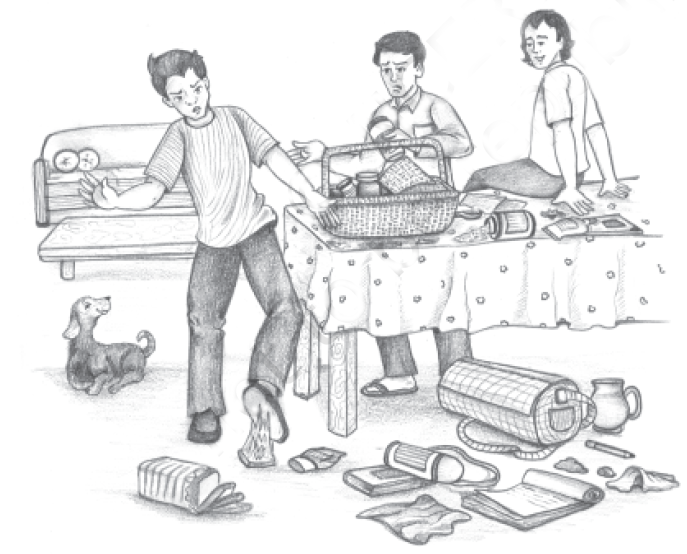
It did. They started with breaking a cup. That was the first thing they did. They did that just to
show you what they could do, and to get you interested.
The scene became interesting as they broke a cup at the start. Jerome says that they broke the cup to indicate that they could do that too and to make things interesting.
Then Harris packed the strawberry jam on top of a tomato and squashed it, and they had to pick out the tomato with a teaspoon.
Squashed: crush or squeeze something with force so that it becomes flat, soft, or out of shape
Harris placed the jar of strawberry jam on top of the tomatoes. The tomatoes were squeezed by the jar and then, they removed the damaged tomato with the help of a spoon.
And then it was George’s turn, and he trod on the butter. I didn’t say anything, but I came over and sat on the edge of the table and watched them. It irritated them more than anything I could have said. I felt that. It made them nervous and excited, and they stepped on things, and put things behind them, and then couldn’t find them when they wanted them; and they packed the pies at the bottom, and put heavy things on top, and smashed the pies in.
trod on: stepped on
Next, George stepped on the butter. Jerome remained silent but sat on the edge of the table to watch the action. His silence irritated his friends. They became nervous and stepped on the things. They kept the things behind them and later, when they wanted them, they could not find them. They placed the pies on the bottom and kept heavier things on them which smashed the pies.
They upset salt over everything, and as for the butter! I never saw two men do more with one-and two pence worth of butter in my whole life than they did. After George had got it off his slipper, they tried to put it in the kettle. It wouldn’t go in, and what was in wouldn’t come out. They did scrape it out at last, and put it down on a chair, and Harris sat on it, and it stuck to him, and they went looking for it all over the room.
Upset: overturned
Scrape: drag or pull
The boys overturned the can of salt on everything. Jerome says that they created a lot of confusion with the small piece of butter. He had not seen anyone create so much mess with butter that was worth one and two pence (meaning it was a very small piece) as they did. George removed it from his slipper and tried to put it into the kettle. As he was unable to do that, he placed it on a chair. Harris sat on it, the butter stuck to him, he stood up and both the boys went around the room looking for the piece of butter.
“I’ll take my oath I put it down on that chair,” said George, staring at the empty seat. “I saw you do it myself, not a minute ago,” said Harris.
Oath: to swear upon something
George looked intently at the empty seat on which he had placed the butter a few minutes ago. He took an oath of truthfulness that he had placed it there not even a minute ago.
Then they started round the room again looking for it; and then they met again in the centre and stared at one another.
Once again, they searched it in the room. They met in the middle of the room empty handed.
“Most extraordinary thing I ever heard of,” said George.
“So mysterious!” said Harris.
Then George got round at the back of Harris and saw it.
“Why, here it is all the time,” he exclaimed, indignantly.
Indignantly: in a manner indicating anger or annoyance at something perceived as unfair
George said that the disappearance of the butter was the most amazing thing that he had known. Harris said that the disappearance of the butter was a mystery. George saw the butter sticking to Harris’s back and said that it had been there all this while.
“Where?” cried Harris, spinning round.
“Stand still, can’t you!” roared George, flying after him.
And they got it off, and packed it in the teapot.
Harris turned around and asked where it was. George flew to Harris’s back and asked him to stand still. They removed the butter and packed it inside the teapot.
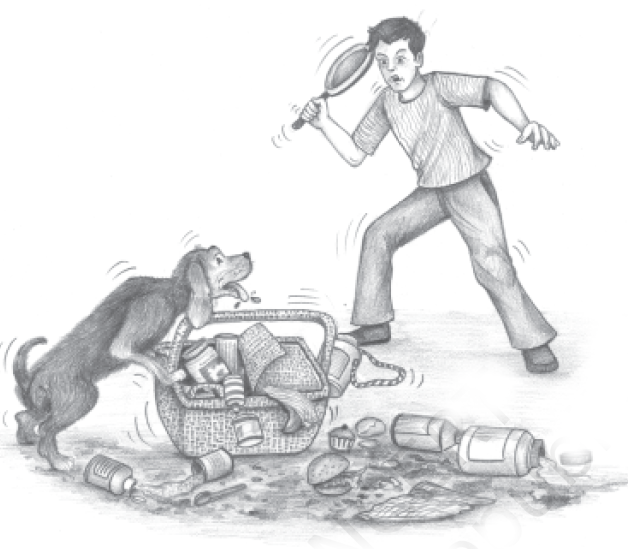
Montmorency was in it all, of course. Montmorency’s ambition in life is to get in the way and be sworn at. If he can squirm in anywhere where he particularly is not wanted, and be a perfect nuisance, and make people mad, and have things thrown at his head, then he feels his day has not been wasted.
sworn at: get scolded
Squirm: to wriggle or twist one’s body
Nuisance: to cause inconvenience or annoyance
Jerome’s pet dog Montmorency participated in all this. His aim was to interrupt everyone and then get scolded for it. Jerome adds that if Montmorency was able to twist into a place and create nuisance by angering people and get things thrown at him in return, he felt that he had utilised the day in a good way.
To get somebody to stumble over him, and curse him steadily for an hour, is his highest aim and object; and, when he has succeeded in accomplishing this, his conceit becomes quite unbearable.
Stumble: to trip over a hurdle
Curse: scold
Conceit: here, his pride in himself
Montmorency’s aim was to get people trip over him and scold him. By doing this, he felt that he had fulfilled his aim and would feel proud of his achievement.
He came and sat down on things, just when they were wanted to be packed; and he laboured under the fixed belief that, whenever Harris or George reached out their hand for anything, it was his cold damp nose that they wanted. He put his leg into the jam, and he worried the teaspoons, and he pretended that the lemons were rats, and got into the hamper and killed three of them before Harris could land him with the frying-pan.
Worried: disturbed
Pretended: to behave as if something is true when you know that it is not
land him: hit or punch someone
Montmorency sat on the things to be packed. He thought that when George and Harris reached out for the things to be packed, they were reaching out for his cold wet nose and would bring it forward for them. He stepped into the jam bottle, he shook the teaspoons, he acted as if the lemons were rats and stepped into the hamper to kill these rats. He was stopped by Harris who hit him with a frying - pan.
Harris said I encouraged him. I didn’t encourage him. A dog like that doesn’t want any encouragement. It’s the natural, original sin that is born in him that makes him do things like that.
Harris blamed Jerome for encouraging Montmorency for doing all this mischief. Jerome say that a dog like Montmorency did not need encouragement. It was born to be like that and act like that.
The packing was done at 12.50; and Harris sat on the big hamper, and said he hoped nothing would be found broken. George said that if anything was broken it was broken, which reflection seemed to comfort him. He also said he was ready for bed. We were all ready for bed. Harris was to sleep with us that night, and we went upstairs.
Reflection: thought
At 12:50, they had packed the hampers. Harris sat on it and said that hopefully, nothing would break in it. George was indifferent and said that if something broke it would not matter. As they were ready for bed, they went upstairs to sleep.
We tossed for beds, and Harris had to sleep with me. He said :
“Do you prefer the inside or the outside, J.?”
I said I generally preferred to sleep inside a bed.
Harris said it was odd.
George said:
“What time shall I wake you fellows?”
Harris said:
“Seven.”
I said:
“No — six,” because I wanted to write some letters.
Tossed: throw something somewhere lightly or casually
As they settled in their beds, Harris asked Jerome if he preferred the inside or the outside of the bed. Jerome said that he preferred to sleep on the inside of the bed. This seemed strange to Harris. George asked them that he should wake them up at what time. Harris replied seven while Jerome wanted to wake up at six as he had to write some letters.
Harris and I had a bit of a row over it, but at last split the difference, and said half-past six. “Wake us at 6.30, George,” we said.
a bit of a row: an argument
split the difference: this means that they agreed on 6.30 because it was halfway between six and seven
Harris and Jerome had a discussion on the time and finally, they settled on half past six, each accommodating his time by half an hour.
George made no answer, and we found, on going over, that he had been asleep for sometime; so we placed the bath where he could tumble into it on getting out in the morning, and went to bed ourselves.
Tumble: to fall quickly and without control
George did not respond as he was asleep. Harris and George made mischief by placing the bathtub next to George’s bed so that he would fall into out as he woke up on the pretext that this way he would take a bath as soon as he got up.
Summary
The narrator of the story, Jerome, was proud of his packing skills. He was supposed to go on a trip with his friends George and Harris. He told them to leave the whole matter of packing to himself, to which they readily agreed. George sat on the easy chair and Harris cocked his legs on the table and watched Jerome do the packing. But this wasn’t what Jerome wanted. When he said that he wanted to do all the packing himself, what he meant was that he was willing to be in charge of everything and direct his friends to work efficiently under his supervision. He was really pissed at them for just sitting about watching him work. It was uncomfortable for Jerome to just sit idle and see another person work alone. His energetic nature made him want to get up and superintend.
When Jerome packed the bag, Harris pointed out that Jerome had forgotten to pack the boots. So, he had to open the bag again and pack his boots in and just he was going to close it, he doubted if he had packed his toothbrush. Whenever he would be about to travel, he would get nightmares of forgetting to pack his toothbrush. Then he would wake up and go on to hunt for it. Then, in the morning, he would pack it before he used it and then he had to unpack again to get it and would repack, forgetting to put the toothbrush in again. Then, he had to rush upstairs to fetch it. He always ends up carrying the toothbrush wrapped up in his pocket-handkerchief.
As usual, Jerome had to search the whole bag. He found George’s and Harris’s toothbrushes eighteen times over but he couldn’t find his own toothbrush. At last, he found it inside a boot and he had to repack once more. After he was done, George asked him if the soap was in but Jerome was so exhausted that he just didn’t seem to care. But after he strapped the bag again, he noticed that he had packed his spectacles inside and he had to open the bag again. Finally, he finished packing at 10:05 pm and now George and Harris decided to pack the food hampers.
George and Harris started by showing that they were better than Jerome at packing. Jerome was excited to see how they would proceed. As he anticipated, they started with breaking a cup. Then, Harris accidentally squashed a tomato by placing strawberry jam on top of it and then he had to pick out the tomato with a teaspoon. Moreover, George stepped on the butter. Now it was Jerome’s turn to sit back and watch them which irritated them. They stepped on things, put things behind them, and then they were unable to find them when they needed them. They put the pie at the bottom and put heavy things on top of it, which ended up ruining the pies. They poured salt all over the place and did wonders with the butter.
George got the butter stuck to his slippers. After he got it off his slippers, they attempted to put it in the kettle but it wouldn’t go in. Then they put it down on a chair but Harris sat on it and the butter stuck to his back. Then they went around looking for it. After a lot of searching, George discovered that it was at the back of Harris the whole time and finally they packed it in the teapot.
And then their pet dog, Montmorency, came into the scene only to add to the commotion. Montmorency was a naughty dog whose aim in life was to create hurdles and get scolded. It was only when he was screamed at that he felt that his day had not been wasted. So, just when things were ready to be packed, he came into the room and sat on them. Whenever Harris or George extended their hand for anything, Montmorency made it a point that they reach for his nose. He put his leg into the jam, disorganized the teaspoons and hampered the lemons.
After uncountable obstacles and tremendous efforts, finally, the packing was done at 12:50 and Harris sat on the hamper hoping that nothing was broken. George consoled himself and Harris by saying that if anything was found broken then it would be because it was already broken.
They all were ready for bed and decided to wake up at half past six. George was already asleep by then. So, George and Jerome placed the bath where he could tumble into on getting up in the morning and went to bed themselves.
Question and Answers
Discuss in pairs and answer each question below in a short paragraph (30–40 words).
Q1. How many characters are there in the narrative? Name them. (Don’t forget the dog!).
A. There are four characters in the story. They are the narrator, Jerome, his friends George and Harris and a dog named Montmorency.
Q2. Why did the narrator (Jerome) volunteer to do the packing?
A. Jerome was proud of his packing skills and so, he offered to do the packing.Actually, he did not intend to do the packing work, but he wanted to supervise his friends and direct them to pack the right way.
Q3. How did George and Harris react to this? Did Jerome like their reaction?
A. George and Harris readily agreed to Jerome’s plan. They sat on the sofa and the chair respectively, and watched Jerome do the packing.
Q4. What was Jerome’s real intention when he offered to pack?
A. Jerome did not intend to do the packing work, but he wanted to supervise his friends and direct them to pack the right way.
Q5. What did Harris say after the bag was shut and strapped? Why do you think he waited till then to ask?
A. After the bag was shut and strapped, Harris pointed out that Jerome had forgotten to pack his boots. I think that he waited till then because he thought that Jerome would pack the boots in the end.
Q6. What “horrible idea” occurred to Jerome a little later?
A. The horrible idea that struck Jerome was that whether he had packed his toothbrush or not.
Q7. Where did Jerome finally find the toothbrush?
A. He found the toothbrush inside a boot.
Q8. Why did Jerome have to reopen the packed bag?
A. Jerome had to reopen the bag because he had packed his spectacles in it.
Q9. What did George and Harris offer to pack and why?
A. George and Harris offered to pack the food baskets. They did so because they wanted to show that they were better packers than Jerome.
Q10. While packing the hamper, George and Harris do a number of foolish and funny things.
Tick the statements that are true.
(i) They started with breaking a cup.
(ii) They also broke a plate.
(iii) They squashed a tomato.
(iv) They trod on the butter.
(v) They stepped on a banana.
(vi) They put things behind them, and couldn’t find them.
(vii) They stepped on things.
(viii) They packed the pictures at the bottom and put heavy things on top.
(ix) They upset almost everything.
(x) They were very good at packing.
A. The true statements are:
(i) They started with breaking a cup.
(iii) They squashed a tomato.
(iv) They trod on the butter.
(vi) They put things behind them, and couldn’t find them.
(vii) They stepped on things.
(ix) They upset almost everything.








